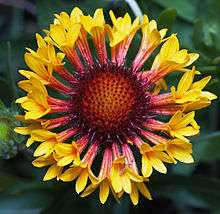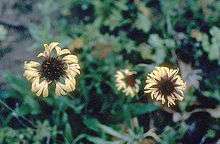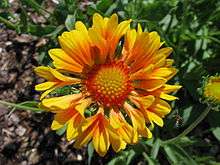Gaillardia
Gaillardia /ɡeɪˈlɑːrdiə/[3] (common name blanket flower)[4] is a genus of flowering plants in the sunflower family, Asteraceae, native to North and South America. It was named after Maître Gaillard de Charentonneau,[5][6] an 18th-century French magistrate who was an enthusiastic botanist. The common name may refer to the resemblance of the inflorescence to the brightly patterned blankets made by Native Americans, or to the ability of wild taxa to blanket the ground with colonies.[7] Many cultivars have been bred for ornamental use.
| Gaillardia | |
|---|---|
.jpg) | |
| Gaillardia pulchella | |
| Scientific classification | |
| Kingdom: | Plantae |
| Clade: | Tracheophytes |
| Clade: | Angiosperms |
| Clade: | Eudicots |
| Clade: | Asterids |
| Order: | Asterales |
| Family: | Asteraceae |
| Subfamily: | Asteroideae |
| Supertribe: | Helianthodae |
| Tribe: | Helenieae |
| Genus: | Gaillardia Foug.[1] |
| Synonyms[2] | |
| |
Description
These are annual or perennial herbs or subshrubs, sometimes with rhizomes. The stem is usually branching and erect to a maximum height around 80 centimeters (31.5 inches). The leaves are alternately arranged. Some taxa have only basal leaves. They vary in shape. They are glandular in most species. The inflorescence is a solitary flower head. The head can have 15 or more ray florets, while some taxa lack any ray florets. They can be almost any shade of yellow, orange, red, purplish, brown, white, or bicolored. They are sometimes rolled into a funnel shape. There are many tubular disc florets at the center of the head in a similar range of colors, and usually tipped with hairs. The fruit usually has a pappus of scales.[8]
Ecology
Gaillardia species are used as food plants by the caterpillars of some Lepidoptera species, including Schinia bina (which has been recorded on G. pulchella), Schinia masoni (which feeds exclusively on G. aristata) and Schinia volupia (which feeds exclusively on G. pulchella).

Symbolism
The school colors of Texas State University are maroon and old gold, a combination inspired by the gaillardia.[9]
Species
- Gaillardia aestivalis (Walter) H.Rock – lanceleaf blanketflower southeastern USA
- Gaillardia amblyodon J.Gay – maroon blanketflower - Texas
- Gaillardia aristata Pursh – common gaillardia - Canada, northern + western USA
- Gaillardia arizonica A.Gray – Arizona blanketflower - Sonora, southwestern USA
- Gaillardia cabrerae (Lihue Calel, Argentina)
- Gaillardia coahuilensis B.L.Turner – bandanna daisy - Coahuila, Texas
- Gaillardia comosa A.Gray - northern Mexico
- Gaillardia doniana (Hook. & Arn.) Griseb. - Argentina
- Gaillardia gypsophila B.L.Turner - Coahuila
- Gaillardia henricksonii B.L.Turner - Coahuila
- Gaillardia megapotamica (Spreng.) Baker - Argentina[10] – boton de oro
- Gaillardia megapotamica var. radiata (San Luis, Argentina)
- Gaillardia megapotamica var. scabiosoides
- Gaillardia mexicana A.Gray - northeastern Mexico
- Gaillardia multiceps Greene – onion blanketflower - Arizona, Texas, New Mexico
- Gaillardia parryi Greene – Parry's blanketflower - Utah, Arizona
- Gaillardia pinnatifida Torr. – red dome blanketflower - northern Mexico, western USA
- Gaillardia powellii B.L.Turner - Coahuila
- Gaillardia pulchella Foug. – firewheel - southern + central USA, central Canada, northern Mexico
- Gaillardia serotina (Walter) H. Rock - southeastern USA
- Gaillardia spathulata A.Gray – western blanketflower - Utah, Colorado
- Gaillardia suavis (A.Gray & Engelm.) Britton & Rusby – perfumeballs - northeastern Mexico, south-central USA
- Gaillardia tontalensis (San Juan Province, Argentina)
- Gaillardia turneri Averett & A.M.Powell - Chihuahua
Hybrids
- Gaillardia × grandiflora hort. ex Van Houtte [G. aristata × G. pulchella][10]
Formerly placed here
- Helenium amarum (Raf.) H.Rock var. amarum (as G. amara Raf.)
- Tetraneuris acaulis (Pursh) Greene var. acaulis (as G. acaulis Pursh)[10]
Gallery
 lanceleaf blanketflower (Gaillardia aestivalis)
lanceleaf blanketflower (Gaillardia aestivalis) firewheel (Gaillardia pulchella)
firewheel (Gaillardia pulchella)- Gaillardia × hybrida 'Kobold'
 Gaillardia × grandiflora 'Oranges and Lemons'
Gaillardia × grandiflora 'Oranges and Lemons'
| Wikimedia Commons has media related to Gaillardia. |
References
- "Genus: Gaillardia Foug". Germplasm Resources Information Network. United States Department of Agriculture. 1998-09-22. Retrieved 2011-02-10.
- "Flann, C (ed) 2009+ Global Compositae Checklist". Archived from the original on 2014-11-30. Retrieved 2014-11-27.
- Sunset Western Garden Book. 1995. 606–07.
- "Gaillardia". Integrated Taxonomic Information System. Retrieved 2011-02-10.
- Fougeroux de Bondaroy, Auguste Denis. Observations sur la Physique, sur L'Histoire Naturelle et sur les Arts. 29: 55. 1786.
- Fougeroux de Bondaroy, Auguste Denis. Memoires de l'Academie Royale des Sciences Paris 1786: 5. 1788.
- Gaillardia × grandiflora. Missouri Botanical Garden.
- Gaillardia. Flora of North America.
- School Colors. Texas State University–San Marcos.
- "GRIN Species Records of Gaillardia". Germplasm Resources Information Network. United States Department of Agriculture. Retrieved 2011-02-10.
Further reading
- Biddulph, S. F. (1944). "A revision of the genus Gaillardia". Res. Stud. State Coll. Wash. 13: 195–256.